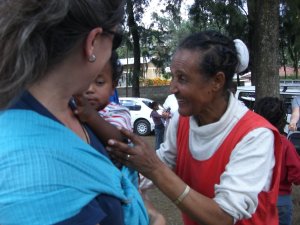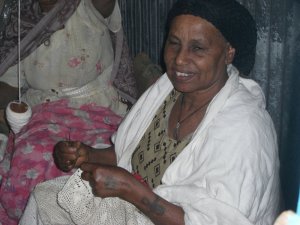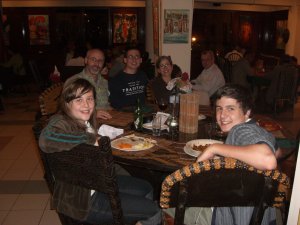How do you describe the indescribable?
You don’t.
Not well anyhow.
You can’t, of course. I guess it’s like being pregnant, you can read about it, hear others talk about it, ad nauseum (pun intended), and yet, you cannot fathom it, or begin to “get” it until you are yourself. That’s what it’s like coming to Addis to adopt a child. Indescribable.
So, all I can offer are moments of what I saw, here and there.
So many people. So many different people. All over. All over the streets, the alleys, everywhere. Ric h people, poor people, suffering disabled people, hap
h people, poor people, suffering disabled people, hap py laughing people, socializing people,
py laughing people, socializing people,
working people. Babies on their mother’s backs in scarves, children by their side, men walking arm in arm, wom en alone or laughing with a girlfriend, old people, young, strong and quick,
en alone or laughing with a girlfriend, old people, young, strong and quick,
feeble. But always worth seeing peopl e, real
e, real
people.
Kolfe.
Kechene.
Kebebetsehay.
The children. Big and small.
Dust. Construction, everywhere, from small shops to large skyscrapers to modern apartments to luxurious homes. Construction. With wooden scaffolding that boggled the American mind on how it held. Construction behind the scaffolding of cement stories; donkeys and burros with wooden saddles to hold cement for the building. Aluminum sides of homes and shops and roofs. Doors that opened for the day in shops by being taken off and leaned against the front wall.
Things for sale. ANYTHING for sale. Everywhere. Seems like almost anything available. clothing, shoes, electronics, music, goats, lamb, trinkets, pots, pans, flowers, cokes, juice, food, gum, maps, hats, balls, wood, rebar, tires, gum…..it’s all there. And if you need or want it, your driver will help you get it.
for sale. Everywhere. Seems like almost anything available. clothing, shoes, electronics, music, goats, lamb, trinkets, pots, pans, flowers, cokes, juice, food, gum, maps, hats, balls, wood, rebar, tires, gum…..it’s all there. And if you need or want it, your driver will help you get it.
Gardens, lush gardens and gorgeous flowers. Color, everywhere so much color a feast. NOT a colorless dry land. A city and land FULL of color. From the sky and plants and flowers to the brightly colored tin shops to the beautiful colored scarves on the women. Color. Everywhere.
The poor. It is a city full of visible poverty. Seems like much much more than the U.S., but then again we tend to hide our poor (unsightly). Here it just is. Yet, there is great wealth here and it’s also side by side with the poor. It all just slips by together. It is a city of constant juxtaposition, which can make your head spin, almost literally. I suppose you get used to it some if you live here for a long time. Maybe.
The countryside. Beautiful. Breathtaking. As far as the eye can see: hills, trees, browns and greens, rolling terrain. YOu can see why people who grow here would never leave. Lakes outside the city, made from old craters; gorgeous views. Belay said he would like to retire here, I can see why.
Cars. Cars and trucks and cars. Everywhere. Honks and beeps. Buses filled with people, standing room only. Taxis filled to overflowing. Cars careening around streets with no lanes, swerving and braking and swerving again. And yet, no crashes. Roads that are fine and sided by gardens. Roads that are bumps and broken rock and patchy asphalt. Solomon, our driver, stopping for pedestrians who need a minute more to cross, the blind, the old. Solomon, shouting away men too pushy to sell through the window but buying gum from the boy with the big smile as he laughs. The dust of pollution and exhaust held in the valley of Addis downtown, a layer blanketing the city. The fresh air of the hilltops as you rise out of the city and open the window.
The traffic police at all the roundabouts that are spotted throughout the city. The armed guards at the Hilton Hotel entrance. The parking meter ladies who have turf from one light pole to the next and have baseball caps on over their scarf covered hair, writing on their tiny notepads and in their dayglo green plastic vests. The stark naked man standing bolt upright, holding a plastic shopping bag on a main thoroughfare, waiting to cross the road or something else. Hard to guess on that one.

The leper colony and rehabilitation center. Seeing them take tufts of cotton wool and then spin it and weave it on large looms and then decorate it into the beautiful textiles that are for sale, to support their center. Buying bunches of linens from them because they are beautiful and they are truly handmade and well, that’s a good spot to spend some money.
Haggling with street vendors, selling the same things in shop after shop. Or my son haggling with the man carrying the handful of fake sunglasses, being thrilled with the ultimate bargain.
 The food. Terrific Italian food and pastas. Fantastic pizza’s from woodburning ovens. Italian pastries and french crepes and croissants. The Ethiopian cultural dinner with injera and chickpeas and music filling the room, eating from a basket woven table called a mesob. The beef tibs in a small black iron pot, like Ethiopian fajitas, to be rolled up in injera.
The food. Terrific Italian food and pastas. Fantastic pizza’s from woodburning ovens. Italian pastries and french crepes and croissants. The Ethiopian cultural dinner with injera and chickpeas and music filling the room, eating from a basket woven table called a mesob. The beef tibs in a small black iron pot, like Ethiopian fajitas, to be rolled up in injera.
The coffee! The best coffee I’ve ever had. Fresh roast ed in front of you, served in espresso cups and with a bit of crystal sugar. Smoother than espresso, richer without a bite. Fantastic. Served with popcorn, that somehow works.
ed in front of you, served in espresso cups and with a bit of crystal sugar. Smoother than espresso, richer without a bite. Fantastic. Served with popcorn, that somehow works.
The call to prayer. Morning and sometimes evening the call to prayer calling me from a sleep, just before it calls to wake my new son. Listening to it being broadcast, the sound of the words unknown to me, it becoming a cascading river of sounds in the background. The extra long, multiple hours, long call to prayer on Sunday. And seeing all the people dressed in white on Sunday as I too was called to prayer at Mass.
The bark of guard dogs. The creaking hinges of the iron gates at all the homes. The wraithlike men who sit all night next to or in a small tin hut by the gates to each road in the neighborhood, keeping ones who don’t belong there out and letting the drivers who do, in. A long lonely job.
The power outages. Most nights in a restaurant the power goes out one, two, three times, then comes right back up. Rolling blackouts throughout the city. People live around it. Power out often in the guest house, we use a small lantern or some candles and plan our showers for later if we can. Not a big deal, surprisingly. Quiet.
Safety. I never felt unsafe. Not once. Granted I had a sheltered pampered life while here. I am no fool. But even so, as an ignorant American, I suspected I might feel unsafe some of the time. I did not. Not once.
So many impressions. Even remembering conjures more. It will take a long time to process it all, if it is even possible. Ethiopia. It’s a big place, in so many ways…even the smallest ways are a universe of thought. This trip changes you, if only on the most superficial level to make you so grateful for the simple practical abundance in your daily life.
Images seared into my brain and heart. We have 1600 photos. We cannot post the most electric ones, the ones that grip my heart. The Ethiopian government won’t allow it. But they are indescribable. And without a doubt, indelible.




